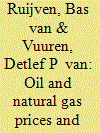| Srl | Item |
| 1 |
ID:
092562


|
|
|
|
|
| Publication |
2009.
|
| Summary/Abstract |
Potentials for bio-energy have been estimated earlier on the basis of estimates of potentially available land, excluding certain types of land use or land cover (land required for food production and forests). In this paper, we explore how such estimates may be influenced by other factors such as land degradation, water scarcity and biodiversity concerns. Our analysis indicates that of the original bio-energy potential estimate of 150, 80 EJ occurs in areas classified as from mild to severe land degradation, water stress, or with high biodiversity value. Yield estimates were also found to have a significant impact on potential estimates. A further 12.5% increase in global yields would lead to an increase in bio-energy potential of about 50%. Changes in bio-energy potential are shown to have a direct impact on bio-energy use in the energy model TIMER, although the relevant factor is the bio-energy potential at different cost levels and not the overall potential.
|
|
|
|
|
|
|
|
|
|
|
|
|
|
|
|
| 2 |
ID:
092809


|
|
|
|
|
| Publication |
2009.
|
| Summary/Abstract |
The hikes in hydrocarbon prices during the last years have lead to concern about investment choices in the energy system and uncertainty about the costs for mitigation of greenhouse gas emissions. On the one hand, high prices of oil and natural gas increase the use of coal; on the other hand, the cost difference between fossil-based energy and non-carbon energy options decreases. We use the global energy model TIMER to explore the energy system impacts of exogenously forced low, medium and high hydrocarbon price scenarios, with and without climate policy. We find that without climate policy high hydrocarbon prices drive electricity production from natural gas to coal. In the transport sector, high hydrocarbon prices lead to the introduction of alternative fuels, especially biofuels and coal-based hydrogen. This leads to increased emissions of CO2. With climate policy, high hydrocarbon prices cause a shift in electricity production from a dominant position of natural gas with carbon capture and sequestration (CCS) to coal-with-CCS, nuclear and wind. In the transport sector, the introduction of hydrogen opens up the possibility of CCS, leading to a higher mitigation potential at the same costs. In a more dynamic simulation of carbon price and oil price interaction the effects might be dampened somewhat.
|
|
|
|
|
|
|
|
|
|
|
|
|
|
|
|